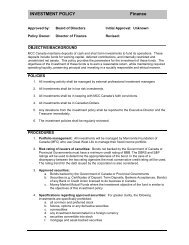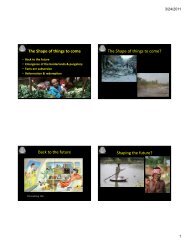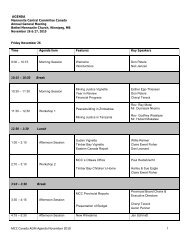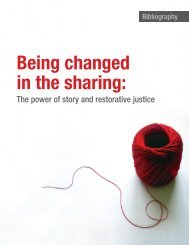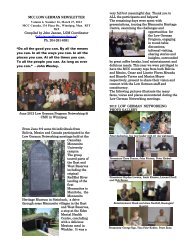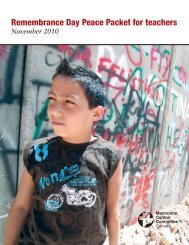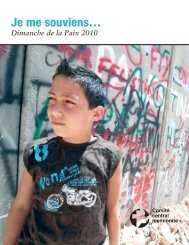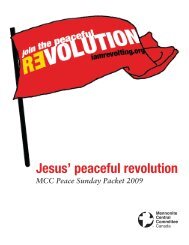Walking together: Healing and hope for Colombian refugees
Walking together: Healing and hope for Colombian refugees
Walking together: Healing and hope for Colombian refugees
You also want an ePaper? Increase the reach of your titles
YUMPU automatically turns print PDFs into web optimized ePapers that Google loves.
64<br />
w a l k i n g<br />
t o g e t h e r<br />
After a traumatic incident, the process is the same, only stronger, <strong>and</strong> “pulling oneself <strong>together</strong>” may not<br />
be easy to do. Depending on how much attention is paid to trauma healing, the effects of the trauma<br />
may linger in unhealthy ways. (see previous pages as well as appendix #3). Or a person may be doing<br />
all right until they bump up against something that is similar to what was present during the original<br />
event (a trigger). It could be a smell, a particular kind of touch, hearing or seeing something that “triggers”<br />
the trauma memory, or an emotion or feeling similar to the initially traumatic one (like loss of control or<br />
shame). Suddenly, the instinctual <strong>and</strong> emotional brain (limbic system <strong>and</strong> brain stem) take over. A lot of<br />
energy is present. It can feel like the trauma event is happening all over again. This is called a flashback.<br />
Some trauma survivors may have flashbacks frequently, others just once or not at all, while others may<br />
just experience a sense of disease, depression, or anxiety.<br />
If members of the refugee family have been experiencing flashbacks, let them know that flashbacks<br />
are a common part of the reaction to trauma. Explain that they are a normal response to an abnormal<br />
situation just as bleeding is a normal response to getting cut, or pain is a normal response to a broken<br />
leg. Reassure them that flashbacks are an indicator that their body is working properly to protect itself<br />
- by remembering what happened, the body is on alert, ready in case it ever happens again. A key<br />
component of trauma is loss of control. Let them know that there are things they can do to help. For<br />
instance, it is often helpful to do some or all of the following after experiencing a flashback:<br />
<br />
<br />
<br />
<br />
<br />
<br />
<br />
<br />
doing other <strong>for</strong>ms of exercise, deep breathing, allowing their body to shake, talking to<br />
someone safe, crying or dancing.<br />
<br />
<strong>and</strong> feel.<br />
<br />
<br />
blue.<br />
<br />
EFFECTS OF REFUGEE TRAUMA ON THE FAMILY<br />
The traumas <strong>and</strong> stresses inherent in the refugee journey can have a profound impact on the family unit.<br />
Even after families arrive to safety in Canada, the effects of the traumatic situations they experienced<br />
can <strong>and</strong> do affect family dynamics. In addition, the process of adapting to a new culture, community <strong>and</strong><br />
language can influence refugee family life. Family break up is commonly seen among <strong>Colombian</strong> refugee<br />
families in Canada, just as it is among internally displaced families in Colombia. This is not necessarily<br />
because these were unstable families to begin with, but more a result of the stress that surviving trauma,<br />
undergoing major life transitions <strong>and</strong> adapting to a new context brings on the family structure. Being<br />
aware of the potential challenges that refugee families will face upon resettlement will help your church<br />
prepare to offer support, counsel <strong>and</strong> orientation to the family as they navigate the new dynamics <strong>and</strong><br />
challenges that greet them as they begin life in Canada.



